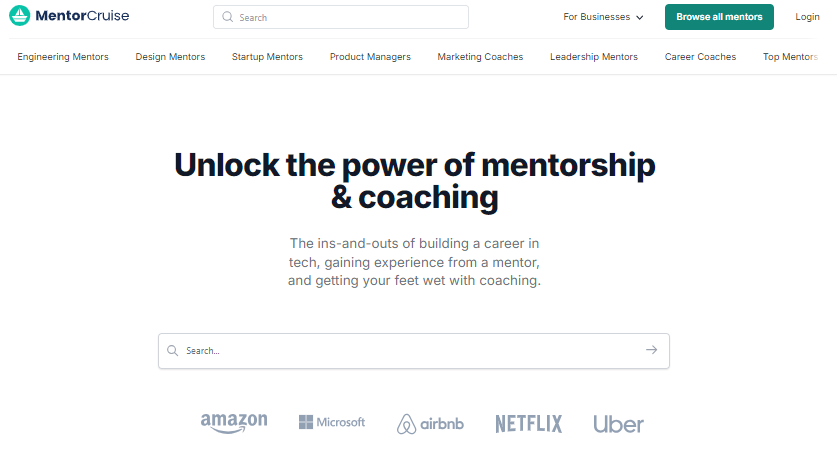At MentorCruise, we have a community of experienced software engineers and web developers who work for companies like Amazon and Microsoft. They guide established and up-and-coming programmers through each step of their coding journey.
In this guide, we will explore how they do it, and the benefits you can get from it.
What is coding mentorship?
Coding mentorship is a relationship between an entry-level or mid-level developer, and an experienced developer. Just like the case of Daniel and Farzad.
A seasoned senior developer, with years of invaluable experience, mentors the mentee by offering guidance through their current challenges and sharing insights for long-term career growth.
What does a coding mentor do?
- Give guidance and feedback: A mentor helps you overcome coding challenges by offering advice on problem-solving strategies, code optimization, and debugging techniques. They can also view your code and provide constructive feedback to improve your code's quality and adherence to best practices.
- Share knowledge and experience: A mentor can show you new concepts, frameworks, and tools you may not be familiar with. Also, you get to hear their personal experiences, including successes and failures, which gives context and insight into real-world scenarios.
- Aid career development: In the same way Clara grew as a developer, your mentor can offer advice on career paths, job opportunities, and industry trends. They can also assist you with resume building, interview preparation, and networking strategies to help you advance your career.
- Encourage best practices: A mentor can also help you develop good coding habits, such as writing clean, maintainable code, following design patterns, and using version control.
- Support personal and professional growth: Motivate and inspire the mentee to set and achieve their goals, both short-term and long-term.
- Provide emotional support and encouragement: Helping the mentee build confidence and resilience in their coding journey.
Different types of coding mentorship
There are various types of mentoring, each having their advantages. The main ones are:One-on-one mentoring: This involves regular meetings with your mentor to discuss progress and challenges. It allows for personal questions and sharing personal challenges freely.
Group mentoring: Involves one mentor working with several mentees. This can be beneficial for learning from peers as well as the mentor.
Peer mentoring: Involves mentoring between colleagues at similar levels. This can provide support and learning opportunities from a peer perspective.
Benefits of coding mentorship
- Less time wasted: While it can feel rewarding to solve problems on your own, trying to figure out everything by yourself can lead to unnecessary delays. In the fast-paced programming world, where frameworks and languages evolve quickly, a mentor can shave weeks months off your coding journey by providing timely advice tailored to your specific challenges.
- A sense of direction: Often, it’s not just the bugs or errors that trip you up; it’s the lack of direction. You might be unsure about which language to master first, whether to focus on front-end or back-end development, or how to break into the tech industry. A mentor can help you map out a clear path in your career, ensuring you’re working on the right skills and projects that align with your goals.
- Get help when you need it most: Ever spent hours banging your head against a wall trying to fix a bug or figure out why your code won’t compile? It’s in those frustrating moments that a mentor can be a lifesaver. They’ve been there before and can guide you around common pitfalls, helping you find solutions more efficiently.
- Boost confidence: Coding can be daunting, especially when you’re just starting out and feeling overwhelmed by the sheer volume of information to learn. A good mentor not only provides technical guidance but also boosts your confidence. They can reassure you when you’re doubting your abilities, offering encouragement and the perspective you need to keep pushing forward.
Joris experienced these benefits when he got a mentor.

Upon deciding to transition into blockchain technology, he figured he needed guidance from someone who was in that space. He started working with his mentor Bob from MentorCruise and it wasn’t long before he landed a role as a Web3 front-end developer in a very promising DeFi startup.
How to find a coding mentor
Say you’re ready for a coding mentorship. How do you go about it, and where can you find a trusted mentor who has the experience needed to guide you through your career?
First off, you have to be clear on what you want out of mentorship, and the kind of experience you would like your mentor to have. Once you know that, you can find a developer mentor by one of these ways:
Coding mentorship platforms
Platforms like MentorCruise have a pool of experts and experienced professionals in a wide range of software engineering and web development roles. All you have to do is browse through, find someone who fits your needs, and reach out to them. Together, you can set effective mentoring goals and kickstart your mentor-mentee relationship.

Benefits of using mentorship platforms
- Easy access to experienced developers: One of the biggest challenges for new programmers is finding a mentor who has the right expertise and availability. Mentorship platforms solve this problem by connecting you with seasoned developers from around the world. Whether you’re looking to master Python, understand complex algorithms, or dive into web development, these platforms make it easy to find someone with the exact experience you need.
- Structured learning pathways: As a beginner, it’s easy to get lost in the vast sea of coding resources available online. Mentorship platforms often provide structured learning pathways, helping you focus on the skills that matter most for your career goals. For instance, if you’re aiming to become a full-stack developer, your mentor can guide you through a step-by-step plan, from mastering HTML and CSS to diving deep into JavaScript frameworks and backend technologies.
- Real-time feedback and code reviews: One of the fastest ways to improve your coding skills is through regular feedback on your work. Mentorship platforms facilitate this by allowing mentors to review your code and provide real-time feedback. This can help you quickly identify and correct mistakes, understand best practices, and learn how to write more efficient, clean, and maintainable code.
- Personalized support and goal setting: Everyone’s coding journey is unique, and a one-size-fits-all approach doesn’t always work. Mentorship platforms offer personalized support, enabling you to set specific goals that align with your aspirations. Whether you’re preparing for a technical interview, working on a personal project, or looking to contribute to open-source, a mentor can tailor their guidance to help you achieve your objectives more effectively.
- Networking and career opportunities: Beyond technical skills, mentorship platforms can also open doors to networking and career opportunities. Your mentor can introduce you to industry contacts, or even collaborate with you on projects that enhance your portfolio. For new and aspiring coders, these connections can be invaluable in landing your first job or advancing to the next level in your career.
Online communities
From Github to Reddit, and every other community in-between, you can find people who may be willing to mentor you, though it may be harder as no one is obligated to help.
Your professional network
You can turn to your professional network online to find a mentor. Generally, people love to help others who are serious about polishing their skills and advancing their career..
However, there are some drawbacks to relying on your professional network, like not finding the most suitable person, or having availability or commitment issues.
Your place of work
If you’re already working as a developer, chances are that you have someone ahead of you in your place of work. A subtle form of mentor-mentee relationship could occur naturally in such an environment, but it’s not as effective having a dedicated mentor who knows he’s obligated to help you grow.
Books and blogs
As a temporary measure, consider turning to books and blogs for guidance when you don't have a mentor. These resources allow you to learn from the failures and successes of other developers while you continue your search for the right mentor. Many developers document their journeys on blogs, offering valuable insights and inspiration for those aiming to achieve similar goals.
Coding mentorship best practices
As you try to find a mentor and reach out to them, follow these best practices to raise your chances of finding the best fit, and getting the most out of the mentorship.
- Know what you want: Whether it’s a change of roles, landing a job in a particular company, or just solving problems more efficiently, you need to be clear on what you need from a mentor.
- Have an idea of the kind of mentor you need: When you’re clear about what you want, it’ll be easy to picture the kind of person that can help you get it. For example, let’s say your goal is to land a Software Engineering role at Google. Most likely you’ll need a mentor who started from a similar background, found his way around, and finally got a similar job at your dream company.
- Set effective goals before starting the mentorship: Having clear goals you’re working towards will make your mentorship more productive. It will also serve as a guide, telling you whether or not you and your mentor are still on track, or getting carried away.
- Keep it professional: The occasional small talk can liven the mood, but it’s important to stay focussed on your growth. Prepare questions ahead of time, and always incorporate the feedback your mentor gives.
- Continuous assessment and feedback: Looking at your direction and the progress made towards your goal will help you determine whether you’re on course, and getting the most from your mentorship.
Kickstart your coding mentorship journey with MentorCruise
If you're pondering as to whether you need a coding mentor, it's likely a sign that your programming career could greatly benefit from one. One of the best places to find the right mentor is through an online community dedicated to connecting you with experts who work at the companies you aspire to join.







